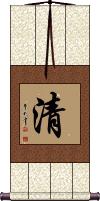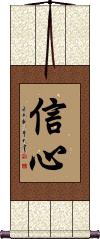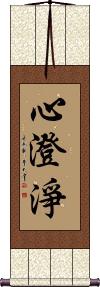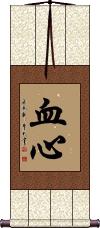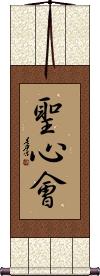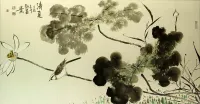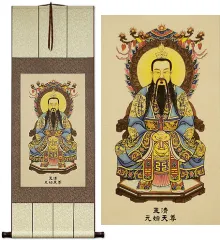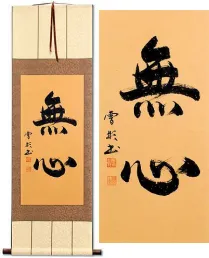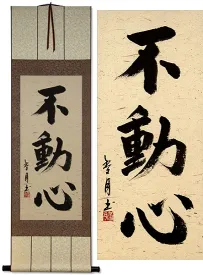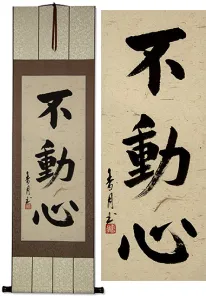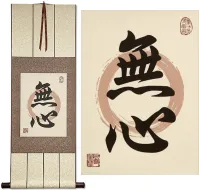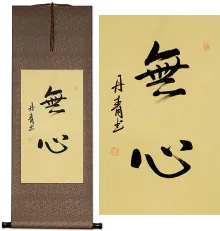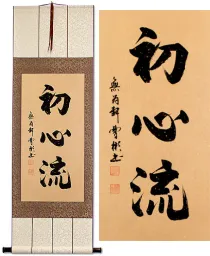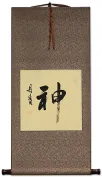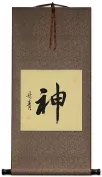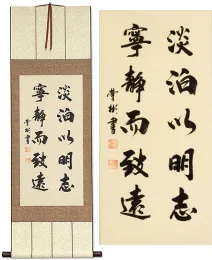Many custom options...
And formats...

The name Pure Mind in Chinese / Japanese...
Buy a Pure Mind calligraphy wall scroll here!
Personalize your custom “Pure Mind” project by clicking the button next to your favorite “Pure Mind” title below...
Clarity
清 is a word that means clarity or clear in Chinese, Japanese Kanji, and old Korean Hanja.
Looking at the parts of this character, you have three splashes of water on the left, “life” on the top right, and the moon on the lower right.
Because of something Confucius said about 2500 years ago, you can imagine that this character means “live life with clarity like bright moonlight piercing pure water.” The Confucian idea is something like “Keep clear what is pure in yourself, and let your pure nature show through.” Kind of like saying, “Don't pollute your mind or body, so that they remain clear.”
This might be stretching the definition of this single Chinese character but the elements are there, and “clarity” is a powerful idea.
Korean note: Korean pronunciation is given above but this character is written with a slight difference in the "moon radical" in Korean. However, anyone who can read Korean Hanja, will understand this character with no problem (this is considered an alternate form in Korean). If you want the more standard Korean Hanja form (which is an alternate form in Chinese), just let me know.
Japanese note: When reading in Japanese, this Kanji has additional meanings of pure, purify, or cleanse (sometimes to remove demons or "exorcise"). Used more in compound words in Japanese than as a stand-alone Kanji.
Confidence / Faithful Heart
信心 is a Chinese, Japanese, and Korean word that means confidence, faith, or belief in somebody or something.
The first character means faith, and the second can mean heart or soul. Therefore, you could say this means “faithful heart” or “faithful soul.”
In Korean especially, this word has a religious connotation.
In the old Japanese Buddhist context, this was a word for citta-prasāda (clear or pure heart-mind).
In modern Japan (when read by non-Buddhists), this word is usually understood as “faith,” “belief,” or “devotion.”
See Also: Self-Confidence
Three Treasures of Chinese Medicine
精, 氣, 神 are the characters jing, qi, and shen.
As a set, these three characters are known in English as the treasures of traditional Chinese medicine, the treasures of Qi Gong, or the three treasures of Taoism / Daoism.
Sometimes this set is titled 三寶 (sānbǎo) or “three treasures,” but here, we're writing each treasure out.
Here's how these characters are perceived in this context...
Jing: nutritive essence; refined; perfected; pure
Qi: vitality; energy; force; breath; vigor
Shen: spirit; soul; mind; being
To keep it simple, you can use “essence, vitality, and spirit” to define these.
Purity of Mind
心澄淨 is the Buddhist concept of the pure and calm mind. It is believed that once you achieve a meditative state of pure focused thought, the mind becomes clear and calm. Although, others will say this means that achieving a calm mind will allow you to reach pure thought.
From Sanskrit, this is known as citta-prasāda. The concept of citta-prasāda is sometimes defined as “clear heart-mind,” or “the single and definitive aspiration.”
Sincere Heart
When you take 血心 apart, you find the sum is slightly different than the parts. The first character means blood, and the second means heart. It is important to note that for thousands of years, it was believed that your heart was both your soul and your mind in Asian culture. When you add blood to the heart, it is your whole being - the pure and clean dedication of your whole soul.
Most Chinese dictionaries define this as the sincerity of heart or a MEDICAL TERM!!!
Please think carefully before ordering this selection - it was only added as others have used this for coffee cups and other novelties (though perhaps naively).
Seishin-Kai / Seishinkai
聖心会 is the Japanese martial arts title “Seishinkai” or “Seishin-Kai.”
It literally means “Sacred Heart Association” or “Pure-Heart Club.”
聖 can mean holy, sacred, saint, sage, virtuous, expert, wise and good, upright, or correct.
心 can mean heart, mind, center, core, spirit, soul, or vitality.
聖心 creates a word meaning sacred heart, or the holy mind (that of Buddha).
会 in Japanese means association, club, meeting, assembly, party, gathering, conference, athletic meet, or society.
This in-stock artwork might be what you are looking for, and ships right away...
Gallery Price: $268.00
Your Price: $148.88
Gallery Price: $200.00
Your Price: $118.88
Gallery Price: $200.00
Your Price: $118.88
Gallery Price: $90.00
Your Price: $49.88
Gallery Price: $79.00
Your Price: $43.88
Gallery Price: $198.00
Your Price: $109.88
Not the results for pure mind that you were looking for?
Below are some entries from our dictionary that may match your pure mind search...
| Characters If shown, 2nd row is Simp. Chinese |
Pronunciation Romanization |
Simple Dictionary Definition |
信 see styles |
xìn xin4 hsin shin しん |
More info & calligraphy: Honesty / Fidelity(1) honesty; sincerity; fidelity; (2) trust; reliance; confidence; (3) (religious) faith; devotion; (counter) (4) counter for received messages; (female given name) Yuki śraddhā. Faith; to believe; belief; faith regarded as the faculty of the mind which sees, appropriates, and trusts the things of religion; it joyfully trusts in the Buddha, in the pure virtue of the triratna and earthly and transcendental goodness; it is the cause of the pure life, and the solvent of doubt. Two forms are mentioned: (1) adhimukti, intuition, tr. by self-assured enlightenment. (2) śraddhā, faith through hearing or being taught. For the Awakening of Faith, Śraddhotpāda, v. 起信論. |
精神 see styles |
jīng shen jing1 shen5 ching shen seishin / seshin せいしん |
More info & calligraphy: Spirit(1) mind; spirit; soul; heart; ethos; (2) attitude; mentality; will; intention; (3) spirit (of a matter); essence; fundamental significance; (given name) Seishin Vitality; also the pure and spiritual, the subtle, or recondite. |
塵 尘 see styles |
chén chen2 ch`en chen chiri ちり |
dust; dirt; earth (1) dust; (2) trash; garbage; rubbish; dirt; (3) (usu. as 塵ほども...ない) negligible amount; tiny bit; (4) hustle and bustle (of life); worldly cares; impurities of the world; (5) (abbreviation) {sumo} (See 塵手水) ritual gestures indicating that a fight will be clean guṇa, in Sanskrit inter alia means 'a secondary element', 'a quality', 'an attribute of the five elements', e.g. 'ether has śabda or sound for its guṇa and the ear for its organ'. In Chinese it means 'dust, small particles; molecules, atoms, exhalations'. It may be intp. as an atom, or matter, which is considered as defilement; or as an active, conditioned principle in nature, minute, subtle, and generally speaking defiling to pure mind; worldly, earthly, the world. The six guṇas or sensation-data are those of sight, sound, smell, taste, touch, and thought. |
識 识 see styles |
zhì zhi4 chih shiki しき |
to record; to write a footnote (1) acquaintanceship; (2) {Buddh} vijnana; consciousness; (3) (after a signature) written by...; (personal name) Tsuguhide vijñāna, "the art of distinguishing, or perceiving, or recognizing, discerning, understanding, comprehending, distinction, intelligence, knowledge, science, learning . . . wisdom." M.W. parijñāna, "perception, thorough knowledge," etc. M.W. It is intp. by 心 the mind, mental discernment, perception, in contrast with the object discerned; also by 了別 understanding and discrimination. There are classifications of 一識 that all things are the one mind, or are metaphysical; 二識 q. v. discriminating the ālaya-vijñāna or primal undivided condition from the mano-vijñāna or that of discrimination; 三識 in the Laṅkāvatāra Sutra, fundamental, manifested and discriminate; 五識 q.v. in the 起信論, i.e. 業, 轉, 現, 知, and 相續識; 六識 the perceptions and discernings of the six organs of sense; also of 8, 9, 10, and 11 識. The most important is the eight of the 起信論, i.e. the perceptions of the six organs of sense, eye, ear, nose, tongue, body (or touch), and mind, together with manas, intp. as 意識 the consciousness of the previous moment, on which the other six depend; the eighth is the ālaya-vijñāna, v. 阿賴耶, in which is contained the seed or stock of all phenomena and which 無沒 loses none, or nothing, is indestructible; a substitute for the seventh is ādāna 'receiving' of the 唯識, which is intp. as 無解 undiscriminated, or indefinite perception; there is a difference of view between the 相 and the 性 schools in regard to the seventh and eight 識; and the latter school add a ninth called the amala, or pure vijñāna, i.e. the non-phenomenal 眞如識. The esoterics add that all phenomena are mental and all things are the one mind, hence the one mind is 無量識 unlimited mind or knowledge, every kind of knowledge, or omniscience. vijñāna is one of the twelve nidānas.; Ālaya-vijñāna and mano-vijñāna; i. e. 阿梨耶 | and 分別事 |; v. 識. |
一向 see styles |
yī xiàng yi1 xiang4 i hsiang ikkou / ikko いっこう |
a period of time in the recent past; (indicating a period of time up to the present) all along; the whole time (adverb) (1) (See 一向に・1) completely; absolutely; totally; (adverb) (2) (in a negative sentence) (not) at all; (not) a bit; (not) in the least; (adverb) (3) earnestly; intently; determinedly; (4) (abbreviation) (See 一向宗) Jōdo Shinshū; (surname) Hitomukai One direction, each direction; with single mind, the mind fixed in one direction undistracted; e.g. 一向淸淨無有女人 (The land of that Buddha is) everywhere pure; no women are there. |
一念 see styles |
yī niàn yi1 nian4 i nien ichinen いちねん |
(1) determined purpose; (2) {Buddh} an incredibly short span of time (i.e. the time occupied by a single thought); (3) {Buddh} (See 浄土宗) a single repetition of a prayer (esp. in Jodo-shu); (personal name) Kazune A kṣaṇa, or thought; a concentration of mind; a moment; the time of a thought, of which there are varying measurements from 60 kṣaṇa upwards; the Fan-yi-ming-yi makes it one kṣaṇa. A reading. A repetition (especially of Amitābha's name). The Pure-land sect identify the thought of Buddha with Amitābha's vow, hence it is an assurance of salvation. |
三心 see styles |
sān xīn san1 xin1 san hsin sanshin さんしん |
(given name) Sanshin The three minds, or hearts; various groups are given: (1) Three assured ways of reaching the Pure Land, by (a) 至誠心 perfect sincerity; (b) 深 profound resolve for it; (c) 廻向接發願心 resolve on demitting one's merits to others. (2) (a) 根本心 The 8th or ālaya-vijñāna mind, the storehouse, or source of all seeds of good or evil; (b) 依本 the 7th or mano-vijñāna mind, the mediating cause of all taint; (c) 起事心 the ṣaḍāyatana-vijñāna mind, the immediate influence of the six senses. (3) (a) 入心 (b) 住心 (c) 出心 The mind entering into a condition, staying there, departing. (4) A pure, a single, and an undistracted mind. There are other groups. |
三界 see styles |
sān jiè san1 jie4 san chieh sangai さんがい |
(1) {Buddh} (See 欲界,色界,無色界) the three realms of existence; (2) (abbreviation) {Buddh} (See 三千大千世界) the whole universe (of a billion worlds) that Buddha enlightened; (3) {Buddh} (See 三世・さんぜ・1) past, present and future existences; (suffix) (4) far-off ...; distant ...; (surname) Mikai Trailokya or Triloka; the three realms; also 三有. It is the Buddhist metaphysical equivalent for the Brahmanic cosmological bhuvanatraya, or triple world of bhūr, bhuvaḥ, and svar, earth, atmosphere, and heaven. The Buddhist three are 欲, 色, and 無色界, i.e. world of sensuous desire, form, and formless world of pure spirit. (a) 欲界 Kāmadhātu is the realm of sensuous desire, of 婬 and 食 sex and food; it includes the six heavens of desire, the human world, and the hells. (b) 色界 Rūpadhātu is the realm of form, meaning 質礙 that which is substantial and resistant: it is above the lust-world and contains (so to speak) bodies, palaces, things, all mystic and wonderful一a semi-material conception like that in Revelation; it is represented in the 四禪天, or Brahmalokas. (c) 無色界 Arūpadhātu, or ārūpyadhātu, is the formless realm of pure spirit, where there are no bodies, places, things, at any rate none to which human terms would apply, but where the mind dwells in mystic contemplation; its extent is indefinable, but it is, conceived of in four stages, i,e. 四空處 the four "empty" regions, or regions of space in the immaterial world, which are 四無色 the four "formless" realms, or realms beyond form; being above the realm of form, their bounds cannot be defined. v. 倶舍論世間品. |
二土 see styles |
èr tǔ er4 tu3 erh t`u erh tu nido |
There are three groups: 性土 and 相土 : the former is the ubiquitous, unadulterated or innocent 法性之理 dharma-name, or essence of things; the latter is the form-nature, or formal existence of the dharma, pure or impure according to the mind and action of the living. The 淨土 and 穢土 are Pure-land or Paradise; and impure land, e.g. the present world. In the Pure-land there are also 報土 , the land in which a Buddha himself dwells and 化土 in which all beings are transformed. There are other definitions, e. g. the former is Buddha's Paradise, the latter the world in which he dwells and which he is transforming, e. g. this Sahā-world. |
二心 see styles |
èr xīn er4 xin1 erh hsin nishin ふたごころ |
disloyalty; half-heartedness; duplicity duplicity; treachery; double-dealing The two minds, 眞心 the original, simple, pure, natural mind of all creatures, the Buddha-mind, i.e. 如來藏心; and 妄心 the illusion-mind, which results in complexity and confusion. Also, 定心 the meditative mind, or mind fixed on goodness; and the 散心 the scattered, inattentive mind, or mind that is only good at intervals. |
二業 二业 see styles |
èr yè er4 ye4 erh yeh nigyou / nigyo にぎょう |
(archaism) restaurants and geisha establishments Two classes of karma. (1) (a) 引業 leads to the 總報, i.e. the award as to the species into which one is to be born, e.g. men, gods, etc.; (6) 滿業 is the 別報 or fulfillment in detail, i.e. the kind or quality of being e.g. clever or stupid, happy or unhappy, etc. (2) (a) 善業 and (b) 惡業 Good and evil karma, resulting in happiness or misery. (3) (a) 助業 Aids to the karma of being reborn in Amitābha's Pure—land e. g. offerings, chantings, etc.; (b) 正業 thought and invocation of Amitābha with undivided mind, as the direct method. |
五智 see styles |
wǔ zhì wu3 zhi4 wu chih gochi ごち |
(place-name, surname) Gochi The five kinds of wisdom of the 眞言宗 Shingon School. Of the six elements 六大 earth, water, fire, air (or wind), ether (or space) 曇空, and consciousness (or mind 識 ), the first five form the phenomenal world, or Garbhadhātu, the womb of all things 胎藏界, the sixth is the conscious, or perceptive, or wisdom world, the Vajradhātu 金剛界, sometimes called the Diamond realm. The two realms are not originally apart, but one, and there is no consciousness without the other five elements. The sixth element, vijñāna, is further subdivided into five called the 五智 Five Wisdoms: (1) 法界體性智 dharmadhātu-prakṛti-jñāna, derived from the amala-vijñāna, or pure 識; it is the wisdom of the embodied nature of the dharmadhātu, defined as the six elements, and is associated with Vairocana 大日, in the centre, who abides in this samādhi; it also corresponds to the ether 空 element. (2) 大圓鏡智 adarśana-jñāna, the great round mirror wisdom, derived from the ālaya-vijñāna, reflecting all things; corresponds to earth, and is associated with Akṣobhya and the east. (3) 平等性智 samatā-jñāna, derived from mano-vijñāna, wisdom in regard to all things equally and universally; corresponds to fire, and is associated with Ratnasaṃbhava and the south. (4) 妙觀察智 pratyavekṣaṇa-jñāna, derived from 意識, wisdom of profound insight, or discrimination, for exposition and doubt-destruction; corresponds to water, and is associated with Amitābha and the west. (5) 成所作智 kṛtyānuṣṭhāna-jñāna, derived from the five senses, the wisdom of perfecting the double work of self-welfare and the welfare of others; corresponds to air 風 and is associated with Amoghasiddhi and the north. These five Dhyāni-Buddhas are the 五智如來. The five kinds of wisdom are the four belonging to every Buddha, of the exoteric cult, to which the esoteric cult adds the first, pure, all-refecting, universal, all-discerning, and all-perfecting. |
佛影 see styles |
fó yǐng fo2 ying3 fo ying butsuyō |
buddhachāyā; the shadow of Buddha, formerly exhibited in various places in India, visible only to those "of pure mind". |
利人 see styles |
lì rén li4 ren2 li jen rihito りひと |
(given name) Rihito To benefit or profit men, idem利他 parahita; the bodhisattva-mind is 自利利他 to improve oneself for the purpose of improving or benefiting others; the Buddha-mind is 利他一心 with single mind to help others, pure altruism; 利生 is the extension of this idea to 衆生 all the living, which of course is not limited to men or this earthly life; 利物 is also used with the same meaning, 物 being the living. |
十宗 see styles |
shí zōng shi2 zong1 shih tsung jūshū |
The ten schools of Chinese Buddhism: I. The (1) 律宗 Vinaya-discipline, or 南山|; (2) 倶舍 Kośa, Abhidharma, or Reality (Sarvāstivādin) 有宗; (3) 成實宗 Satyasiddhi sect founded on this śāstra by Harivarman; (4) 三論宗 Mādhyamika or 性空宗; (5) 法華宗 Lotus, "Law-flower" or Tiantai 天台宗; (6) 華嚴Huayan or法性 or賢首宗; ( 7) 法相宗 Dharmalakṣana or 慈恩宗 founded on the唯識論 (8) 心宗 Ch'an or Zen, mind-only or intuitive, v. 禪宗 ; (9) 眞言宗 (Jap. Shingon) or esoteric 密宗 ; (10) 蓮宗 Amitābha-lotus or Pure Land (Jap. Jōdo) 淨士宗. The 2nd, 3rd, 4th, and 9th are found in Japan rather than in China, where they have ceased to be of importance. II. The Hua-yen has also ten divisions into ten schools of thought: (1) 我法倶有 the reality of self (or soul) and things, e.g. mind and matter; (2) 法有我無 the reality of things but not of soul; (3) 法無去來 things have neither creation nor destruction; (4) 現通假實 present things are both apparent and real; (5) 俗妄眞實 common or phenomenal ideas are wrong, fundamental reality is the only truth; (6) things are merely names; (7) all things are unreal 空; (8) the bhūtatathatā is not unreal; (9) phenomena and their perception are to be got rid of; (10) the perfect, all-inclusive, and complete teaching of the One Vehicle. III. There are two old Japanese divisions: 大乘律宗, 倶舎宗 , 成實 宗 , 法和宗 , 三論宗 , 天台宗 , 華嚴宗 , 眞言宗 , 小乘律宗 , and 淨土宗 ; the second list adds 禪宗 and omits 大乘律宗. They are the Ritsu, Kusha, Jōjitsu, Hossō, Sanron, Tendai, Kegon, Shingon, (Hīnayāna) Ritsu, and Jōdo; the addition being Zen. |
四法 see styles |
sì fǎ si4 fa3 ssu fa shihō |
There are several groups of four dharma: (1) 教法 the teaching of the Buddha); 理法 its principles, or meaning; 行法 its practice; 果法 its fruits or rewards. (2) Another group relates to bodhisattvas, their never losing the bodhi-mind, or the wisdom attained, or perseverance in progress, or the monastic forest life (āraṇyaka). (3) Also 信解行證 faith, discernment, performance, and assurance. (4) The Pure-land 'True' sect of Japan has a division: 教法, i. e. the 大無量壽經; 行法 the practice of the seventeenth of Amitābha's vows; 信法 faith in the eighteenth; and 證法 proof of the eleventh. The most important work of Shinran, the founder of the sect, is these four, i. e. 教行信證. (5) A 'Lotus ' division of 四法 is the answer to a question of Puxian (Samantabhadra) how the Lotus is to be possessed after the Buddha's demise, i. e. by thought (or protection) of the Buddhas; the cultivation of virtue; entry into correct dhyāna; and having a mind to save all creatures. |
圓覺 圆觉 see styles |
yuán jué yuan2 jue2 yüan chüeh engaku |
Complete enlightenment potentially present in each being, for all have 本覺 primal awareness, or 眞心 the true heart (e. g. conscience), which has always remained pure and shining; considered as essence it is the 一心 one mind, considered causally it is the Tathāgata-garbha, considered it is|| perfect enlightenment, cf. 圓覺經. |
客塵 客尘 see styles |
kè chén ke4 chen2 k`o ch`en ko chen kakujin |
āgantu-kleśa, the foreign atom, or intruding element, which enters the mind and causes distress and delusion; the mind is naturally pure or innocent till the evil element enters; v. 煩惱. |
心性 see styles |
xīn xìng xin1 xing4 hsin hsing shinsei / shinse しんせい |
one's nature; temperament mind; disposition; nature Immutable mind-corpus, or mind-nature, the self-existing fundamental pure mind, the all, the Tathāgata-garbha, or 如來藏心; 自性淸淨心; also described in the 起信論 Awakening of Faith as immortal 不生不滅. Another definition identifies 心 with 性 saying 性卽是心, 心卽是佛 the nature is the mind, and mind is Buddha; another, that mind and nature are the same when 悟 awake and understanding, but differ when 迷 in illusion; and further, in reply to the statement that the Buddha-nature is eternal but the mind not eternal, it is said, the nature is like water, the mind like ice, illusion turns nature to mental ice form, awakening melts it back to its proper nature. |
心月 see styles |
xīn yuè xin1 yue4 hsin yüeh mizuki みづき |
(female given name) Mizuki Mind (as the) moon, the natural mind or heart pure and bright as the full moon. |
心珠 see styles |
xīn zhū xin1 zhu1 hsin chu miju みじゅ |
(female given name) Miju The mind stuff of all the living, being of the pure Buddha-nature, is likened to a translucent gem. |
性心 see styles |
xìng xīn xing4 xin1 hsing hsin shōshin |
The perfectly clear and unsullied mind, i. e. the Buddha mind or heart. The Chan (Zen) school use 性心 or 心性 indifferently. |
本覺 本觉 see styles |
běn jué ben3 jue2 pen chüeh hongaku |
Original bodhi, i. e. 'enlightenment', awareness, knowledge, or wisdom, as contrasted with 始覺 initial knowledge, that is 'enlightenment a priori is contrasted with enlightenment a posteriori'. Suzuki, Awakening of Faith, P. 62. The reference is to universal mind 衆生之心體, which is conceived as pure and intelligent, with 始覺 as active intelligence. It is considered as the Buddha-dharmakāya, or as it might perhaps be termed, the fundamental mind. Nevertheless in action from the first it was influenced by its antithesis 無明 ignorance, the opposite of awareness, or true knowledge. See 起信論 and 仁王經,中. There are two kinds of 本覺, one which is unconditioned, and never sullied by ignorance and delusion, the other which is conditioned and subject to ignorance. In original enlightenment is implied potential enlightenment in each being. |
梵心 see styles |
fàn xīn fan4 xin1 fan hsin bonshin |
The noble or pure mind (which practises the discipline that ensures rebirth in the realm without form). |
業處 业处 see styles |
yè chù ye4 chu4 yeh ch`u yeh chu gossho |
karmasthāna; a place for working, of business, etc.; the place, or condition, in which the mind is maintained in meditation; by inference, the Pure Land, etc. |
淨命 净命 see styles |
jìng mìng jing4 ming4 ching ming jōmyō |
Pure livelihood, 正命, i.e. that of the monk. Also the life of a pure or unperturbed mind. |
淨心 净心 see styles |
jìng xīn jing4 xin1 ching hsin Jōshin |
The pure heart or mind, which is the original Buddha-nature in every man. |
直心 see styles |
zhí xīn zhi2 xin1 chih hsin jikishin じきしん |
{Buddh} true and honest heart; pure heart; heart devoted to Buddhism; (female given name) Naomi Straightforward, sincere, blunt. |
眞如 see styles |
zhēn rú zhen1 ru2 chen ju shinnyo しんにょ |
(surname) Shinnyo bhūtatathatā, 部多多他多. The眞 is intp. as 眞實 the real, 如 as 如常 thus always or eternally so; i.e. reality as contrasted with 虛妄 unreality, or appearance, and 不變不改 unchanging or immutable as contrasted with form and phenomena. It resembles the ocean in contrast with the waves. It is the eternal, impersonal, unchangeable reality behind all phenomena. bhūta is substance, that which exists; tathatā is suchness, thusness, i.e. such is its nature. The word is fundamental to Mahāyāna philosophy, implying the absolute, the ultimate source and character of all phenomena, it is the All. It is also called 自性淸淨心 self-existent pure Mind; 佛性 Buddha-nature; 法身 dharmakāya; 如來藏 tathāgata-garbha, or Buddha-treasury; 實相 reality; 法界 Dharma-realm; 法性Dharma-nature; 圓成實性 The complete and perfect real nature, or reality. There are categories of 1, 2, 3, 7, 10, and 12 in number: (1) The undifferentiated whole. (2) There are several antithetical classes, e.g. the unconditioned and the conditioned; the 空 void, static, abstract, noumenal, and the 不 空 not-void, dynamic, phenomenal; pure, and affected (or infected); undefiled (or innocent), i.e. that of Buddhas, defiled, that of all beings; in bonds and free; inexpressible, and expressible in words. (3) 無相 Formless; 無生 uncreated; 無性 without nature, i.e. without characteristics or qualities, absolute in itself. Also, as relative, i.e. good, bad, and indeterminate. (7, 10, 12) The 7 are given in the 唯識論 8; the 10 are in two classes, one of the 別教 cf. 唯識論 8; the other of the 圓教, cf. 菩提心義 4; the 12 are given in the Nirvana Sutra. |
真白 see styles |
majiro まじろ |
(out-dated or obsolete kana usage) (adj-na,adj-no,n) (1) pure white; (2) blank (e.g. mind, paper); (personal name) Majiro |
Click here for more pure mind results from our dictionary
The following table may be helpful for those studying Chinese or Japanese...
| Title | Characters | Romaji (Romanized Japanese) | Various forms of Romanized Chinese | |
| Clarity | 清 | sei | qīng / qing1 / qing | ch`ing / ching |
| Confidence Faithful Heart | 信心 | shin jin / shinjin | xìn xīn / xin4 xin1 / xin xin / xinxin | hsin hsin / hsinhsin |
| Three Treasures of Chinese Medicine | 精氣神 精气神 | jīng qì shén jing1 qi4 shen2 jing qi shen jingqishen | ching ch`i shen chingchishen ching chi shen |
|
| Purity of Mind | 心澄淨 | shin chou jou shinchoujou shin cho jo | xīn chéng jìng xin1 cheng2 jing4 xin cheng jing xinchengjing | hsin ch`eng ching hsinchengching hsin cheng ching |
| Sincere Heart | 血心 | xuě xīn / xue3 xin1 / xue xin / xuexin | hsüeh hsin / hsüehhsin | |
| Seishin-Kai Seishinkai | 聖心会 / 聖心會 聖心会 | sei shin kai seishinkai | ||
| In some entries above you will see that characters have different versions above and below a line. In these cases, the characters above the line are Traditional Chinese, while the ones below are Simplified Chinese. | ||||
Successful Chinese Character and Japanese Kanji calligraphy searches within the last few hours...
